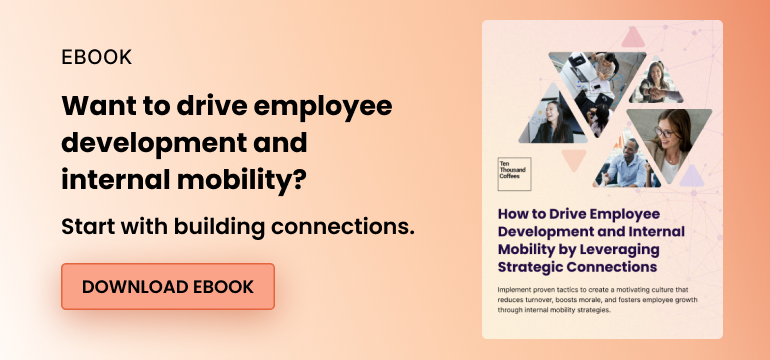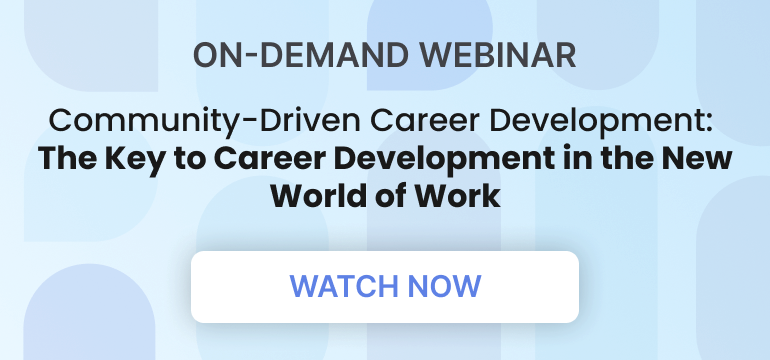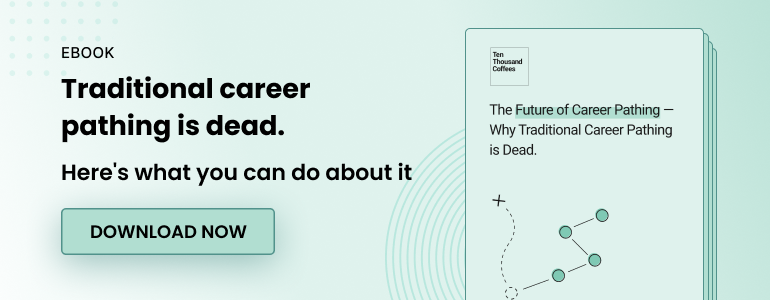The majority of the workforce wants to learn new skills and climb through the ranks. In fact, having a path for career growth is a priority for 90% of employees. However, the reality is that many of them don’t know where to start, and this disconnect holds back both your people and your business.
In today’s world of non-linear career paths, employees understandably struggle to plot their own course. That's where you come in. By supporting career development plans for your team, you empower them to navigate their own growth trajectories.
In this article, we’ll cover the basics of career development plans, the benefits, and some tips to create career development plans that help your organization—and your employees—reach their goals.
What is a career development plan?
A career development plan is a blueprint that outlines an employee’s career goals and the steps they’ll take to get there.
Put simply, it’s a roadmap that organizations use to help employees reach their professional objectives. A comprehensive plan will highlight where an employee is today, their long-term career aspirations, and all the roles and skills they’ll acquire along the way.
In the modern workplace where career paths aren’t always linear or clear-cut, it’s vital that every plan is unique and tailored to each employee’s needs and goals. This is why personalized career development plans have become an increasingly important part of organizations’ learning and development strategies
Career pathing can be extremely overwhelming for employees, and career development plans are particularly important for early talent or diverse and underrepresented employees. Only 42% of organizations say their career development and internal mobility processes are effective, and just 19% say HR has good metrics associated with career development.
Employees’ number one motivation to learn is to progress towards career goals, and providing learning opportunities is the top way organizations are working to improve retention. If employees don’t feel like there are opportunities to grow, they’re more likely to jump ship.
All this being said, career development plans are key to helping employees make meaningful progress toward their career objectives.

8 benefits of career development plans
While career development plans are vital to helping employees reach their own goals, they’re also valuable tools for employer success. That’s why investing in organization-driven career development plans is becoming an increasingly common talent strategy.
When organizations implement career development plans, they can:
- Increase the rate of employee promotion.
- Build internal talent pipelines and fill future open roles.
- Identify and address organizational skills gaps.
- Create a sense of purpose and motivation within the workforce.
- Boost employee engagement, satisfaction, and retention.
- Level up employee skill sets and productivity.
- Create a culture of learning and development.
- Increase overall organizational success.
Career development plan best practices: for companies and employers
We know that no two career development plans are the same. However, the most successful plans and development strategies have a few things in common.
We’ve rounded up some of the best practices to consider when developing your organization’s career plan strategy.
1. Break it up into smaller career milestones
Coming up with lofty career goals can be fun and exciting. But we can’t reach those goals overnight.
Breaking larger goals down into short-term milestones can make those long-term goals more achievable. These smaller milestones can help strike a careful balance between making big motivating goals but ensuring that they’re also achievable.
These stepping stones serve as markers along the way. Without them, it can be difficult to see progress, which can quickly lead to frustrated and demotivated employees.
2. Take the time to set expectations
As a leader, your goal is to encourage your employees to set big goals and reach them. But sometimes, achieving a career goal can be a decades-long process. For example, a developer may have a long-term goal of becoming a CTO. However, it will take many roles and years before they are ready for that ultimate goal role.
It’s important to set realistic expectations with employees for how long it might take and the challenges they might encounter along the way. This ensures employees aren’t disappointed if things don’t happen the way they might expect them to.
You can set expectations in a few different ways. For example, providing rough timelines for those milestones we discussed can help employees get a better sense of the timeline. It also gives them a sense of what’s ahead of them so they can be prepared.
3. Don’t be afraid to talk about the missing links
Career development isn’t just always about what’s next. Sometimes it’s worth looking back and at the current situation to identify what’s missing. Similar to setting expectations, it’s important to provide open and honest feedback on the things that can be barriers to employees achieving their goals.
This is where having manager expertise and guidance can come in handy. Employees themselves aren’t always the best judge of their current skill set and they likely don’t understand the full scope of the skills expected of them as they progress through their careers. This is the perfect opportunity for a leader to educate them on the concrete experiences they’ll need to develop to improve professionally.
Telling an employee that they might be missing critical experience can feel like delivering bad news. But think about it this way: the sooner they understand their gaps, the sooner they can fill them and reach their goals.
4. Create intentional opportunities to discuss employee development
Only 15% of employees have regular career growth conversations. And as we know, career development is a bit of a long game.
Employees and businesses are busy. So it’s easy for career development to quickly become overshadowed by other business needs.
Successful development programs ensure that employee development plans stay a priority. Part of the plan should include cadences to review goals, check in on milestones, and make necessary changes. As an employee’s professional trajectory evolves with new skills and competencies, it’s important to provide opportunities to re-assess their current plan to course-correct when necessary.
5. Career development should be a community effort
Career development can’t happen in a silo. Employees need the support of the people around them, not just for motivation but to create opportunities for them to grow in their careers. In fact, 32% of employees actually want their training and development to include a social element.
A community-driven approach to career development puts employees in the driver’s seat of their career plan. It increases visibility and connects employees with the right networks so they can identify opportunities to reach their own unique goals.
With the right networks, it can even potentially identify new paths of career development. Take media communications company, Dentsu Aegis Network for example. They partnered with 10KC to boost employee networks and visibility into career paths within the organization. By simply introducing employees to other people within the organization, 4 out of 5 employees were able to identify other areas within the organization that they are interested in working in, creating more paths of growth for employees.
CASE STUDY: How Dentsu Aegis Network connects colleagues and promotes internal talent mobility

What to include in a career development plan
We know career development plans are critical to helping employees reach their professional aspirations. But it goes beyond simply identifying those goals.
There are a few things that make for a career development plan that is useful and easy to follow. Otherwise, employees can easily get discouraged, fall off the plan, and make it challenging for your organization to reap the rewards.
Every plan will look a bit different but should typically include:
- Long-term career goals
- Short-term career goals
- Measurable milestones that can help reach those goals
- Action items to reach those milestones
- Timelines for reaching goals and evaluating progress
Creating an internal career development template is a great way to make sure all your employees have plans that cover the most important details.
6 steps to creating a career development plan for employees
Career development shouldn’t fall solely on your employees. While they certainly play a heavy role in the process, successful career growth comes from having the right processes and resources in place for your employees.
Fortunately, career development plans can offer big benefits for both you and your people. And they’re easier to implement at scale than you might think. Here are a few steps to approach creating career development plans for your employees.
Step 1: Create standardized processes for career planning
Every employee in your organization might have a unique career development plan, but the process to create those plans and the resources available to your employees should be standard across the board. This reduces bias in the process and sets employees up for success. It also makes career development easier for employees and their managers, so they’re more likely to stay on top of it.
So before you start to create employee career development plans, you should think about how those plans will be created, what they’ll look like, and the resources you’ll provide to support them.
Step 2: Create and provide employees with the right resources
Employees should be the drivers of their own professional development. But they need the right tools, networks, and resources to do so.
This is particularly true for diverse and underrepresented talent who may have limited access to resources and networks to provide them with new opportunities. Many employees may not even understand the potential career paths available to them.
Before even encouraging employees to identify their career goals, you should make sure that you have the resources in place to support them. How will they have access to skill development? How can they provide feedback on their goals? Otherwise, you could be setting up employees for disappointment.
Examples of resources to support internal career planning can include:
- Mentorship: Deploy a mentorship program and partner employees with mentors to gain personalized guidance, expand their professional networks, and receive crucial feedback for growth.
- Career development tools: Provide a curated library of videos, articles, development programs, and assessment tools to empower employees to design their own career paths.
- Training opportunities: Offer a mix of structured training programs and hands-on experiences for targeted skill development for employees at every stage of their career, including, early talent, high potentials, and leadership.

Step 3: Set short and long-term career development goals
Now that you've laid the groundwork, it's time to guide your employees in designing their development roadmaps.
The journey begins with reflection. Encourage employees to define their short-term and long-term career goals. These goals will illuminate the skills and experiences that will bring them closer to their vision.
Remember, career development is a two-way street. Consider your company's objectives. What talent gaps need to be filled? What future opportunities might arise?
By aligning employee development with your company's growth, you create win-win scenarios. For instance, if an employee aspires to a role that doesn't align with your company's future, open a dialogue about equally fulfilling alternatives that meet both individual and organizational needs.
Step 4: Identify the relevant milestones
Now that you know where the plan leads, it’s time to set all the stops in between.
Let’s take a mid-level content marketer, for example. Say that this employee wants to become a digital marketing manager. This is a management-level position that oversees content, affiliate, and paid marketing channels, and they’d like that role within the next five years.
Here’s an example of how you might identify the relevant roles and development opportunities:
- Content writer (12 months)
- SEO strategist (6 months)
- Content marketing manager (12 months)
- Begin training in affiliate partnerships (last 6 months of the position)
- Assistant to the digital marketing manager (12 months)
- Includes training in pay-per-click (PPC) marketing (last 6 months of the position)
- Digital marketing manager
One thing that’s often overlooked at this stage is how you’ll measure these milestones.
Promotions and new positions are easy to measure. But what about those skills and development goals?
Let’s consider the content marketer’s career development plan. An example of a measurement that could be used to define their affiliate marketing acumen could be that they’re able to execute an affiliate partnership from start to finish.
Of course, every position and skill set might have a different associated metric. However, if one isn’t outlined, it can be difficult to tell if an employee is actually reaching the relevant milestones that have been set.
Step 5: Create a personalized action plan
A plan is as only good as the steps taken afterward to put it in motion. So it’s important to ask how an employee can achieve the things that they’ve outlined in the previous step.
If we look back at the content marketer, one action item may be to take an SEO course so they can get ready to step into the SEO strategist role in a year’s time. Another might be for a manager to introduce them to an SEO expert within the organization.
Remember: the action plan shouldn’t be limited to the employee. It’s important to consider how your organization and your leaders can support your employees in their development.
For example, you might have budgets set aside for training opportunities. Or you may have a system in place to help connect employees with the right mentors for their goals.
Step 6: Review and revise the plan regularly
Continuous feedback is often what makes an employee successful in their development. They might not achieve everything they set out to do at first—and that’s okay. But sometimes this requires a trusted manager or mentor to give them constructive feedback so that they can improve. Their plan may need to be adjusted to account for any unexpected growth or challenges that can impact the original plan.
And of course, things change and people change. Over the course of an employee’s development, they may develop different interests or even life circumstances that impact their career goals. When that happens, an employee’s career development plan should be adjusted to reflect those changes.
Setting regular check-in points and times to review progress can go a long way in making sure that an employee’s career development plan is still working for them.
How technology helps with career development plans
Individualized career development plans—particularly when implementing them across the organization—can be a herculean effort. To help employees develop and execute plans, it’s not enough to simply have a strategy in place.
Technology can help you effectively scale your career development plan strategy by:
- Expanding access to networks and resources: Introduce employees to peers and mentors in 1:1 and group settings to provide them with access to new opportunities and insights that might be otherwise unavailable to them.
- Offering structured programs to drive meaningful growth: Guided curriculums can help managers and employees navigate the career planning process seamlessly by setting up review cadences and guiding discussions so that they drive growth.
- Reducing the administrative challenges of career development: Manually tracking career development plans can quickly prove to be tedious and difficult to scale. With the right technology, you can make sure employees have easy access to great resources, and you can measure the impact of implementing career development plans.
- Making career development simple: Adding more to your team’s plates can be a big ask. Using technology to integrate career development with the tools you use every day can make prioritizing growth easier for program administrators and employees.
.png)









.png)